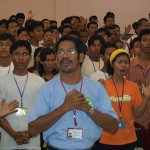August 25, 2009
Short and Long Term Mission Tips
By Brian Maher – missionary to Cambodia, have served 15 years in Cambodia. www.maherministry.org
1) Preparations (understanding Cambodian culture, dealing Cambodian nationals, basic language prep and greeting)
One of the first things we need to ask ourselves is why are we going? What are our goals? We must not go with the typical attitude of we have the technology, ability and knowledge, and we need to show you how it is done. One needs to embrace short-term missions with the idea of being a learner, servant, listener and story teller. Short-term missions will change you more than it will change anyone else.
It might be more accurate to label your short-term trip as a vision trip, because it will set your perspective for the rest of your life. Because you paid big money for air tickets, you probably feel the need to do something big and significant. That will not happen. Be prepared to see your spent funds as an investment in your personal and spiritual growth.
God made us all for relationship and that should be your first priority; to make friends and build relationships. Listen, be polite, don’t be thinking about how you can ‘help’ the nationals. Just listen to their stories and feel with them. Ask about their families.
Only 10% of understanding a culture is language and most Cambodians speak English in the cities so in preparation, don’t worry so much about language as understanding some culture and history. But it would help to learn some simple phrases like, good morning, hello, how are you, what is your name, and where is the water closet? You can have access to these phrases by asking Cambodians in your community.
Suggested Reading:
Killing Fields, Living Fields, Don Cormack
Brother Enemy, Nayan Chanda
History of Cambodia, David Chandler
Ministering Cross Culturally, Sherwood Lingenfelter
Cambodia, Helen Penfold
Cathedral of the Rice Paddies, Francois Ponchaud.
Suggested Preparation Activities
Invite some local Cambodians to put a cultural night for your group.
Include skits, drama, and cultural dance.
Include testimonies of life under the Khmer Rouge.
Set appointments for a Cambodian person to come teach your group some simple language exercises.
Things to be aware of:
Do not cause Cambodians to lose face or be embarrassed. This will alienate you rather quickly.
Do not show your anger even if you are getting taken advantage. Get a mediator (another Cambodian) to solve your problem for you and reward them later.
Do not touch a person’s head, especially when they are older than you.
Learn the proper way of greeting older Cambodians.
Small change for beggars is no big deal but be prepared to be frustrated with beggars after a while but do not get angry.
You may bargain and barter for things in the market and at stores.
Bring some small souvenirs from the US for the children of families you meet and take to.
2) Suggestions for working with local churches:
§ This is Cambodia and Cambodians know their culture and how to operate with in it. Don’t assume your perspectives and practices translate here and don’t attempt import modern western techniques to a culture that is traditional, modern and postmodern. Globalization has caused quite and identity crisis and you don’t want to add to it. Ask churches how you can help them rather than impose your western plans. Teach English, help with software or computer systems, etc, and don’t use your money, white skin or education as leverage. Come in as a learner, and then you earn the right to tell your story.
1- Do not make funding promises and promises you cannot keep.
2- Working with young people is a way in as you can often introduce new games or social activities for them for fellowship purposes.
3- Don’t do anything without checking with the pastor first.
4- Don’t make a big deal about Bible translation issues. Just go with what the church uses.
3) Safety Tips
1- Do not wear fanny packs, keep your passport and $$$ in the hotel safe.
2- Make photo copies of your passport.
3- Register with embassy.
4- Bring Passport photos if you are getting a visa at Pochentong.
5- Check you passport for expiration or if it has enough pages for stamping.
6- If you are Cambodian, dress like a national or you will call undue attention to yourself and become a target for scams.
7- Have someone you trust meet you at the airport. Be cautious with taxi drivers suggesting hotels.
8- You can use USD and only need to change a small amount of money on occasions.
9 - Try not to be out after 9 pm unless you are in a car.
4) Evangelism:
Door to door or street evangelism is illegal in Cambodia but you may tell your story to friends and family, or in a market or while someone is fixing your flat tire.
Avoid using rote techniques; Four Spiritual Laws, EE, Romans Road, etc. They are largely irrelevant but your story is not. Techniques promise things in a formula that are not always true. Your story is your experience. Be a learner, a listener, a friend, and then tell your unique story of God’s working in your life through the body of Christ.
If you stick to the above advice, there is no worrying about officials.
Do not hand out track or money. These are useless techniques and government does not like it.
Understanding Your Long Term Missionaries
Missionaries dealing with expectations:
1- Missionaries often feel they always must portray a positive, upbeat newsletter report when in fact they are hurting and need help. Can you read through the lines?
2- On deputation before leaving for the field, missionaries must be passionate about what they are unsure about doing. Their whole passion or focus may change on the field in the first year. What is your response to that?
3- Is the sending church and supporting churches clear about what they expect of their missionaries to be doing, starting when, and to what extent? What does their sending agency expect of them vs. their sending church?
4- Are you expecting a grocery list for a report, transparency, or both? How can you let them know what you want when they have to please a range of supporters?
In Developing (hardship) countries, every type of stress in multiplied!
5- Learning a new language may be too difficult for some. What then? Missionaries may learn to hate the culture they sacrificed their lives to get to.
6- Expect marital strife, disappointment, and even depression on one or both sides as the missionary couple cycles through phases of cultural adjustment.
7- Can you read through the lines in their communication or do just scan their letters?
8- Do you insist they get out of the country at least twice a year for a two week break and do they have the finances to do it.
9- Are there good professional counselors on the ground who they can be encouraged to utilize?
10- Many missionaries in times of distress, stress or conflict self-medicate and rationalize this. Is there a way you can look into this?
Communicating with Your Missionaries
11- Sometimes you may receive email correspondence that might seem demanding, curt, intense, or even arrogant. Do you take it as a personal affront, or can you read through the lines? How will you respond?
12- Remember that email carries a lot of different tones, and attitudes. How can you communicate to your missionaries without communicating judgment or criticism that you may not even intend? You cannot hit ‘un-send.’
13- Encouragement vs. Admonishment? Both are biblical. When and how will you use them and in what percentage?
14- Remember birthdays and special days help. Care packages with special things and especially news from home is encouraging.
15- Have you learned to use skype, and inexpensive way of calling overseas?
16- What other positive ways have you learned in communicating with your missionaries?
Missionaries are from Mars, Supporters, friends and families are from Venus
1- After sometime on the field, especially in developing countries where US policy played a role in why they are called “developing” countries, you may find your missionaries developing new theological, political and philosophical perspectives different from your and your sending church.
I.e. No longer patriotic, questioning American foreign and domestic policy, comments about American lifestyles, theology that prefers the poor and oppressed, etc. How will you respond to these changes?
ü When missionaries do challenge supporters on these issues they mean well but it is almost impossible not to be perceived as arrogant or full of spiritual pride. How can you let them be prophetic without feeling like ‘who do they think they are.’ Remember they have a big view of this world that you don’t have. They know your world and they know theirs. You only know your world. How can engage in profitable dialogue?
Mission Field as Lemon Squeezer
When a couple leaves for the field, they might think they have it all together. A new culture, new people and being away from all they know as familiar are a big changes and big stressors. After a while it will bring to the surface every piece of psychological baggage the mind worked so hard to subconsciously suppress over a whole life. Overtime on the field, psychological baggage surfaces one by one or many at time due to the pressure of overseas ministry. God is actually doing this person a favor so they can recognize it and deal with it. If the missionary does not recognize the unhealthy baggage and deal with it seriously, they may begin to:
1- Self-medicate (drugs or alcohol).
2- Adultery
3- Become a mission-a-holic (workaholic)
4- Experience serious marital conflict, separation, and/or divorce
5- Engage in domestic Abuse
6- Staff Abuse
7- Verbally abuse your children
8- Internet Porn
9- Withdrawal
10- Communicate much less.
*I have seen all this and more on the field and experienced some myself.
How, for someone who is perhaps a half a world away, know this might be happening and what steps could you take to help prevent it. Most sending churches or supporters don’t know until the couple is on their way back in spiritual body bags. What can be done from your side? Anything?
Sending Agencies and Member Care
There was never any communication between the sending agency and my sending church, and both had conflicting expectations. The sending agency said, “Don’t worry about accomplishing much on your first term, learn the language, culture and make a lot of friends with the people.” My sending church within a few months of our arrival, were looking for a grocery list of converts, bible studies, and people witnessed to, etc. It caused me a lot of emotional strife by feeling guilty I wasn’t doing enough.
1- What can you do for your missionaries to help them fall into this pitfall?
Member Care: Having worked with two mission organization and one large Christian NGO in fifteen years, my experience with member care has been not a very favorable one. We only really had one excellent member care staff who kept up with us on a regular basis but the rest were either incompetent, or never fulfilled their promises to follow up with us. Member care is what sending agencies supposedly provide for the missionaries they accept and send.
2- How can you as a sending church or individual ensure your missionaries are getting good member care or psychological care without causing strife between missionaries and their agencies (maybe that might be necessary at times?)?
Most sending agencies are like brokerage firms for your missionaries. They do the accounting, maybe newsletters, produce your W-2 forms and market your ministry if it is attractive to their donors. They promise good member care, and organize great regional or worldwide conferences which are often very encouraging but are often too expensive to go to.
3- In these days of financial stress, what can the church pick up for your missionaries that the sending agency charges them for (newsletters, special publications, etc)?
4- Sending agencies mean well but don’t always deliver. How can you know your sending agency is serving your missionaries well? Have you ever thought about this?
Wrong Motivations
There has been a lot psychological studies on the nature of missionaries, for example, most are Type ‘A’ personalities, independent, entrepreneurs, pioneering, risking, and first born, trying to please their fathers who they felt were never quite satisfied with them. No missionaries have totally pure motives of serving overseas, and all vary in degrees of correct motivation. But God works with us through that, if we don’t stay in denial.
There are two symptoms for missionaries that don’t know what to do with them selves when they get overseas is to set up an orphanage, or a Bible School. In many developing countries, neither is warranted on a large basis. Many missionaries who never confront their bent motivations for ministering in developing countries end up Building their own Kingdoms. This often comes in the form of starting Bible Schools, orphanages, producing material with their names on it, and lots of traveling in the region to get their names known, etc. Not many missionaries building their own Kingdoms ever change, but to catch them early on might give one a better change to confront denial.
1- How can you recognize this happening in your missionaries?
2- What steps could you take to prevent this?
3- Are you playing into there trap by believing and therefore encouraging them that big is always better?
4- Have you thought about whether or not their vision is in line with the real needs on the ground in their desired country of service?
ü Have you taken the time to ask difficult questions to your missionaries before sending them?
ü Sending agencies have many psychological tests candidates have to take but they can all be fudged. I have done it myself. What more can we do to ensure we have healthy people going to the field?
Summary of My Own Experiences
Our biggest encouragement from back home:
1) When we request extra funding, a handful people send it without question.
2) People visiting us on the field and seeing our work, begin to understand our perspective and did not react negatively to our reports, emails or newsletter but tried to understand more. Therefore, we make new friends who understand us.
Our biggest encouragement in country:
1) The pastor of our International Church and his interest in us as a couple.
2) Some decent counselors who helped in time where we needed therapy.
3) Some close expat friends who exchanged challenges, obstacles, disappointments, and joys.
Written by: Cambodianchristian.Com
Filed Under: All, Articles, In English, Lesson, Mission Tip
Trackback URL: http://www.cambodianchristian.com/article/wp-trackback.php?p=35







WJ
August 25, 2009 at 11:01 am
Thanks Brian,
Very helpful